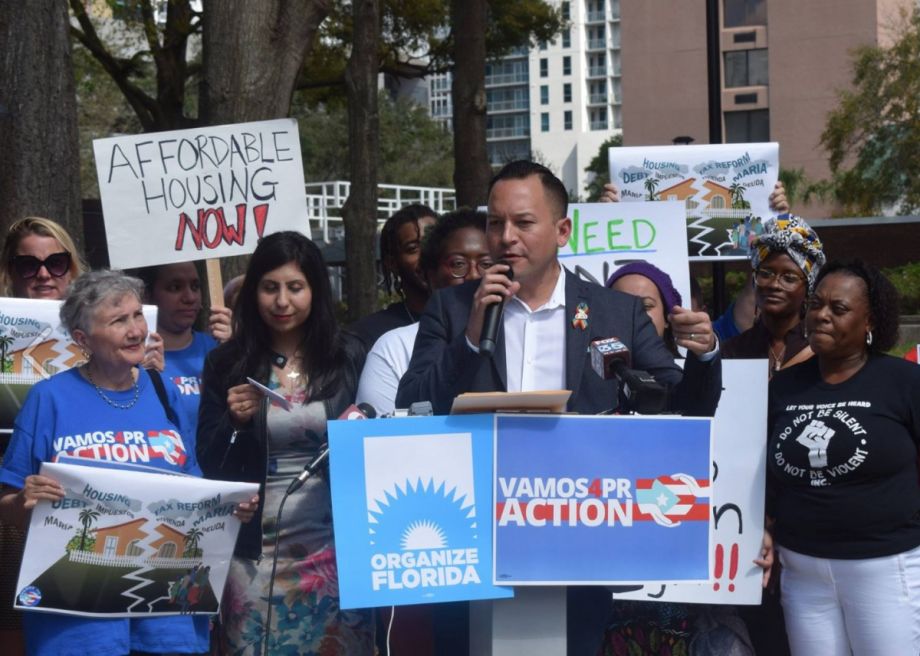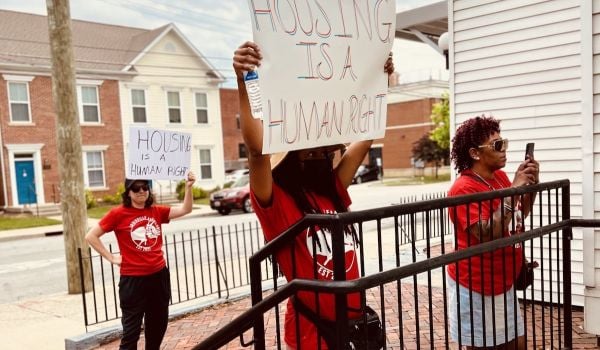Javier Figueroa moved to Orlando in November 2017, not long after Hurricane Maria wreaked havoc on his hometown of Manatí, a small city on the north coast of Puerto Rico. After living on FEMA housing aid for about a month, he started looking for an apartment for himself, his wife, his mother and his 7-year-old son near his son’s school. He applied for a lease in a housing complex, paying $85 apiece for background checks for the three adults in the household. The rent was $1,197 per month, he says. According to the application, he was supposed to show that he earned at least three times that amount. That was basically impossible, Figueroa says. He has a disability and receives Social Security insurance income. It wasn’t until a Puerto Rican woman who worked in the leasing office helped him navigate the application process that he was able to secure the apartment.
After a year, Figueroa moved his family to a low-income housing development in nearby Apopka, Florida. He paid a $100 fee to have his family placed on the waiting list, he says. The deposit for the apartment was $1,294, and his family lived in a hotel for a week between leases. It’s been over a month since he left his last apartment and he still hasn’t gotten his security deposit back.
Until he moved to Florida, Figueroa, who is 42, had never been involved in community organizing. But he now works with Vamos4PR, which advocates for the Puerto Rican diaspora. Over the last few years, Figueroa has talked with lawmakers about the difficulty of finding and keeping an apartment for families like his in Florida.
In early March, two of those lawmakers, State Rep. Carlos Guillermo Smith, who represents parts of Orlando, and State Sen. José Javier Rodríguez, who represents parts of Miami, introduced identical bills that would grant a sweeping set of new rights to tenants across the state. Among the provisions in the legislation are a “just cause” eviction clause, requirements that leases be provided in the preferred language of the tenant, a right of first refusal for tenants when their landlords are selling their buildings, and a rule that would require landlords to pay back three times the security deposit amount if they fail to return the deposit within 30 days of the end of a lease.
“We started talking at the beginning of this year about the need to protect renters in the state of Florida,” Smith says. “So many of Florida’s laws and protections are centered around landlords, and we think that’s wrong, because so many tenants and renters face problems when it comes to fair treatment in housing.”
The legislation was crafted in cooperation with a coalition of advocacy groups across the state, Smith says. They include Organize Florida, the Community Justice Project, Manufactured Housing Action, and Vamos4PR. (A Vamos4PR spokeswoman, Carolina Gonzalez, helped me and Javier Figueroa talk over the phone in English and Spanish last week.) The legislation is a push in the direction of more stability for renters, they say, if not the silver bullet to solve the state’s housing crisis.
“We all really care about increasing renter protections in the state, because there’s really not that many at all, and promoting a narrative around rent control and how it’s a simple solution to the crisis,” says Sheena Johnson, campaigns director for Organize Florida.
According to the National Low Income Housing Coalition, Florida has a shortage of more than 425,000 housing units for extremely low-income renters — families of four with less than $24,600 in yearly income. In Orlando, the affordable housing market is particularly tight, with just 17 rentals accessible to every 100 extremely low-income renters. And housing advocates say the state’s tenant protections are unusually weak; a RentCafe analysis concluded that Florida is one of the most landlord-friendly states in the U.S.
Johnson says Organize Florida works to empower low-income tenants in their conflicts with their landlords. Last fall, the group helped tenants in an Orlando apartment complex organize an effort to have city officials enforce rampant code violations, including caved-in roofs, broken lights and infestations. The effort resulted in the city imposing the maximum fine on the building’s owner: $1,500 a day until the violations were resolved, Johnson says. Laws like those introduced in the state legislature will help tip the scales back in tenants’ favor, she says.
“The root of [the crisis] is gentrification and capitalism,” Johnson says. “But in terms of figuring out how to have a solution without dealing with the root causes of it, we need to have a state that has strong renter protections and a state that has some sort of landlord accountability.”
Also included in the legislation: housing protections for survivors of domestic abuse, language prohibiting discrimination against tenants based on gender identity and sexual orientation, a prohibition on evictions during states of emergency, and a requirement that landlords provide three months’ notice when they’re planning to raise rents by more than 5 percent. Other bills introduced recently in the legislature would undo a state law that limits local rent control policies and prevent the legislature from repeatedly raiding the state’s housing fund, known as the Sadowski Affordable Housing Trust Fund. According to a report in the South Florida Sun-Sentinel, lawmakers have diverted money from the fund every year since 2003 to balance the state budget.
Carlos Guillermo Smith says he wasn’t surprised that a group of landlords came out in opposition to the new bills as soon as they were introduced. (A landlord group in Florida did not respond to a request for an interview.) Passage of the bills is not a sure thing, Smith says, but if they are approved, they’ll enact a comprehensive set of tenant protections in a state that has fewer than most.
“The legislature is full of people who want to protect the rights of landlords, and that’s fine,” Smith says. “But there needs to be balance. We have a tough hill to climb, there’s no question. But what I’m really excited about is, this is really creating a conversation and highlighting the abuses that are happening.”
This article is part of Backyard, a newsletter exploring scalable solutions to make housing fairer, more affordable and more environmentally sustainable. Subscribe to our weekly Backyard newsletter.

Jared Brey is Next City's housing correspondent, based in Philadelphia. He is a former staff writer at Philadelphia magazine and PlanPhilly, and his work has appeared in Columbia Journalism Review, Landscape Architecture Magazine, U.S. News & World Report, Philadelphia Weekly, and other publications.
Follow Jared .(JavaScript must be enabled to view this email address)


















